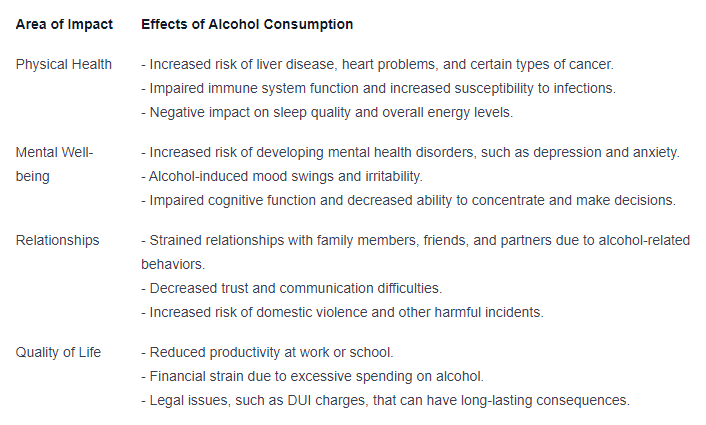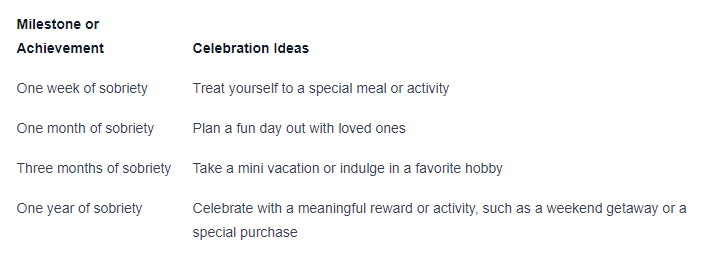How to Quit Drinking (or at Least Cut Back)

Acknowledging the Challenge
Before embarking on the journey to quit drinking or cut back, it is essential to acknowledge the challenges associated with alcohol consumption. This section aims to provide a deeper understanding of the impact of alcohol and help individuals recognize the need for change.
Understanding the Impact of Alcohol
Alcohol can have a significant impact on various aspects of a person's life, including physical health, mental well-being, relationships, and overall quality of life. By understanding these effects, individuals can gain insight into the importance of quitting or reducing alcohol consumption.

Recognizing the Need for Change
Recognizing the need for change is a crucial step in the journey to quit drinking or cut back. It involves acknowledging the negative impact that alcohol has on one's life and making a commitment to prioritize personal well-being and health.
By recognizing the need for change, individuals can begin to take ownership of their actions and make positive choices. It is important to remember that seeking help and support is a sign of strength, and there are resources available to assist in this process.
Understanding the impact of alcohol and recognizing the need for change are pivotal in taking the first steps towards a healthier and more fulfilling life. The next section will focus on assessing one's relationship with alcohol, providing an opportunity for self-reflection and evaluation to better understand personal triggers and patterns.
Assessing Your Relationship with Alcohol
Before embarking on the journey to quit drinking or cut back, it's important to assess your relationship with alcohol. This involves self-reflection and evaluation, as well as identifying triggers and patterns that may contribute to your drinking habits.
Self-Reflection and Evaluation
Taking the time to reflect on your alcohol consumption can provide valuable insights into your relationship with alcohol. Ask yourself the following questions:
- How often do you drink?
- How many drinks do you typically have in one sitting?
- Do you find it difficult to stop drinking once you've started?
- Have you experienced negative consequences as a result of your drinking?
- Do you feel the need to drink to cope with stress or emotions?
- Have others expressed concern about your drinking habits?
Answering these questions honestly can help you gain a clearer understanding of the impact alcohol has on your life and whether it's time for a change.
Identifying Triggers and Patterns
Identifying triggers and patterns associated with your drinking can further assist in assessing your relationship with alcohol. Triggers can be emotional, social, or environmental factors that lead to cravings or the desire to drink. Some common triggers include:
- Stressful situations
- Social events or gatherings
- Certain people or places
- Emotional states such as sadness or anxiety
By recognizing these triggers, you can develop strategies to avoid or manage them effectively. Additionally, analyzing patterns in your drinking habits, such as specific days of the week or times when you're more likely to drink, can help you understand the underlying reasons behind your alcohol consumption.
Consider keeping a journal to track your drinking habits, including the date, time, and circumstances surrounding each instance. This can provide valuable data for self-reflection and help you identify any problematic patterns or behaviors.
Assessing your relationship with alcohol through self-reflection, evaluation, and identifying triggers and patterns is an important step in the process of quitting drinking or cutting back. By gaining a deeper understanding of your alcohol consumption, you can develop strategies to overcome challenges and make lasting changes in your life.
Setting Goals and Making a Plan
When it comes to quitting drinking or cutting back on alcohol consumption, setting clear goals and creating a solid plan are essential steps in the journey to change. This section will explore two crucial aspects of this process: establishing your motivation and creating a concrete plan.
Establishing Your Motivation
Before embarking on the path to quitting drinking or cutting back, it's important to establish your personal motivation. Understanding why you want to make this change will provide you with a strong foundation and help you stay committed throughout the process.
Take some time for self-reflection and identify the reasons behind your desire to quit or reduce alcohol consumption. Your motivation may stem from various factors, such as improving your physical and mental health, enhancing relationships, achieving personal goals, or regaining control over your life. It's helpful to write down your motivations and refer to them whenever you face challenges along the way.
Creating a Concrete Plan
Once you have established your motivation, the next step is to create a concrete plan that outlines the specific steps you will take to achieve your goal of quitting drinking or cutting back. A well-defined plan can provide structure, guidance, and accountability throughout your journey.
Start by setting realistic and achievable goals. Break down your ultimate objective into smaller, measurable milestones. For example, if your goal is to quit drinking altogether, you might set a milestone to abstain from alcohol for one week, then gradually increase the duration.
To help you stay on track, consider using a table to track your progress. Here is an example:

In addition to setting goals, it's important to identify potential obstacles and develop strategies to overcome them. This could involve avoiding situations or environments where alcohol is present, seeking support from loved ones, or finding alternative activities to replace drinking.
Remember, everyone's journey is unique, and it's crucial to tailor your plan to your specific needs and circumstances. While it's important to be disciplined, be kind to yourself and allow for flexibility if needed. The road to quitting drinking or cutting back may have bumps along the way, but with a well-crafted plan and strong motivation, you can navigate through them and achieve your goals.
Strategies for Quitting or Cutting Back
When it comes to quitting or cutting back on drinking, implementing effective strategies can greatly increase your chances of success. Here are three key strategies to consider: seeking professional help and support, building a strong support system, and exploring therapy and counseling options.
Seeking Professional Help and Support
Seeking professional help and support is a vital step in the journey towards quitting or reducing alcohol consumption. Professionals such as doctors, therapists, and counselors can provide guidance, expertise, and specialized treatment options. They can assess your situation, provide personalized advice, and help you navigate the challenges that may arise along the way.
Professional Help and Support Options
Medical professionals
Addiction specialists
Counselors or therapists
Support groups
Building a Strong Support System
Building a strong support system is crucial for maintaining motivation and accountability during the process of quitting or cutting back on drinking. Surrounding yourself with individuals who understand and support your goals can make a significant difference. This support system can include family members, friends, or support groups specifically tailored to individuals seeking sobriety.
Components of a Strong Support System
Understanding and non-judgmental family and friends
Sober or supportive friends
Support groups (e.g., Alcoholics Anonymous)
Online communities and forums
Exploring Therapy and Counseling Options
Therapy and counseling can be valuable tools in addressing the underlying factors contributing to alcohol consumption and developing healthier coping mechanisms. Different therapeutic approaches, such as cognitive-behavioral therapy (CBT) or motivational interviewing, can help you understand your relationship with alcohol, identify triggers, and develop effective strategies for change.
Therapy and Counseling Options
Cognitive-behavioral therapy (CBT)
Motivational interviewing
Dialectical behavior therapy (DBT)
Group therapy
Remember, everyone's journey is unique, and what works for one person may not work for another. It's important to find the strategies and support that resonate with you. By seeking professional help, building a strong support system, and exploring therapy and counseling options, you can increase your chances of successfully quitting or cutting back on drinking.
Implementing Lifestyle Changes
Implementing lifestyle changes is an essential part of quitting or cutting back on drinking. By adopting healthier coping mechanisms, discovering new hobbies and interests, and prioritizing self-care and well-being, individuals can create a supportive environment for their journey towards a healthier relationship with alcohol.
Finding Healthy Coping Mechanisms
Finding healthier coping mechanisms is crucial when trying to quit drinking or reduce alcohol consumption. It's important to identify alternative ways to manage stress, emotions, and triggers without turning to alcohol. Here are some healthy coping strategies to consider:
Coping Mechanisms
Engaging in regular physical exercise
Practicing mindfulness or meditation
Seeking support from friends and family
Joining support groups or attending meetings
Engaging in creative outlets such as painting or writing
Exploring relaxation techniques like deep breathing or yoga
By incorporating these healthy coping mechanisms into daily life, individuals can better manage cravings, reduce stress, and stay committed to their goal of quitting or cutting back on drinking.
Discovering New Hobbies and Interests
Finding new hobbies and interests can be an effective way to fill the void left by alcohol and create a fulfilling and meaningful lifestyle. Engaging in activities that bring joy and fulfillment can help shift the focus away from alcohol. Consider exploring the following hobbies and interests:
Hobbies and Interests
Reading or joining a book club
Trying out new recipes or cooking classes
Taking up a musical instrument
Exploring nature through hiking or gardening
Volunteering for a cause you're passionate about
Learning a new language or engaging in cultural activities
By immersing oneself in new hobbies and interests, individuals can discover new passions, meet like-minded individuals, and create a sense of purpose beyond alcohol.
Prioritizing Self-Care and Well-Being
Prioritizing self-care and well-being is crucial for maintaining a healthy lifestyle and avoiding triggers that may lead to drinking. By focusing on self-care, individuals can improve their overall well-being and develop a stronger foundation for sobriety. Consider the following self-care practices:
Self-Care Practices
Getting enough quality sleep
Engaging in regular relaxation exercises
Practicing good nutrition and hydration
Setting boundaries and saying no when necessary
Engaging in regular self-reflection and self-assessment
Seeking professional help when needed
By prioritizing self-care, individuals can enhance their physical, mental, and emotional health, which in turn supports their efforts to quit drinking or reduce alcohol consumption.
Implementing these lifestyle changes can significantly contribute to the success of quitting or cutting back on drinking. By finding healthy coping mechanisms, exploring new hobbies and interests, and prioritizing self-care and well-being, individuals can create a fulfilling and alcohol-free life. Remember, it's essential to seek professional help and build a strong support system to ensure long-term success in this journey.
Overcoming Challenges and Staying Committed
Quitting drinking or cutting back can be a challenging journey, but with the right strategies and mindset, it is possible to overcome obstacles and stay committed to your goals. Here are some key aspects to consider:
Managing Cravings and Temptations
Cravings and temptations are common when trying to quit or cut back on drinking. It's important to develop effective strategies to manage these challenges. Here are some techniques that can help:
- Identify triggers: Take note of situations, emotions, or people that trigger your cravings. By being aware of your triggers, you can develop strategies to avoid or cope with them.
- Distract yourself: Engage in activities that divert your attention away from cravings. This could be exercising, reading, practicing a hobby, or spending time with supportive friends and family.
- Practice mindfulness: Mindfulness techniques, such as deep breathing and meditation, can help you stay present and manage cravings. These techniques can provide a sense of calm and help you resist the urge to drink.
- Seek support: Reach out to a support system, such as a therapist, counselor, or support group. They can provide guidance, encouragement, and strategies to navigate cravings and temptations.
Dealing with Relapses
Relapses are common during the journey of quitting or cutting back on drinking. It's important to view relapses as a temporary setback rather than a complete failure. Here are some steps to help you deal with relapses:
- Recognize triggers and patterns: Reflect on the circumstances that led to the relapse. Understanding the triggers and patterns can help you develop strategies to prevent future relapses.
- Don't be too hard on yourself: It's important to practice self-compassion and avoid self-blame. Remember that setbacks are a natural part of the process, and you can learn from them.
- Revisit your motivation: Remind yourself of the reasons why you wanted to quit or cut back on drinking in the first place. Use this motivation to recommit to your goals and move forward.
- Seek support: Reach out to your support system for guidance and encouragement. They can provide the necessary support and help you get back on track.
Celebrating Milestones and Progress
Recognizing and celebrating milestones and progress is essential to staying motivated and committed to your goals. Here are some ways to celebrate your achievements:

By acknowledging and celebrating your milestones, you reinforce your progress and boost your confidence in maintaining your commitment to quitting or cutting back on drinking.
Remember, overcoming challenges requires patience, perseverance, and support. Be kind to yourself, seek help when needed, and celebrate your achievements along the way.
Conclusion
In conclusion, quitting or cutting back on drinking can be a challenging journey, but with the right strategies and support, it is possible to achieve your goals. By setting realistic goals, identifying potential obstacles, seeking professional help and support, building a strong support system, exploring therapy and counseling options, implementing lifestyle changes, managing cravings and temptations, dealing with relapses, and celebrating milestones and progress along the way, individuals can navigate through the challenges of quitting drinking or reducing alcohol consumption.
Remember that everyone's journey is unique, so it's important to tailor your plan to your specific needs and circumstances. With discipline, perseverance, and self-compassion, you can successfully quit drinking or cut back on alcohol consumption and live a fulfilling life free from addiction.
